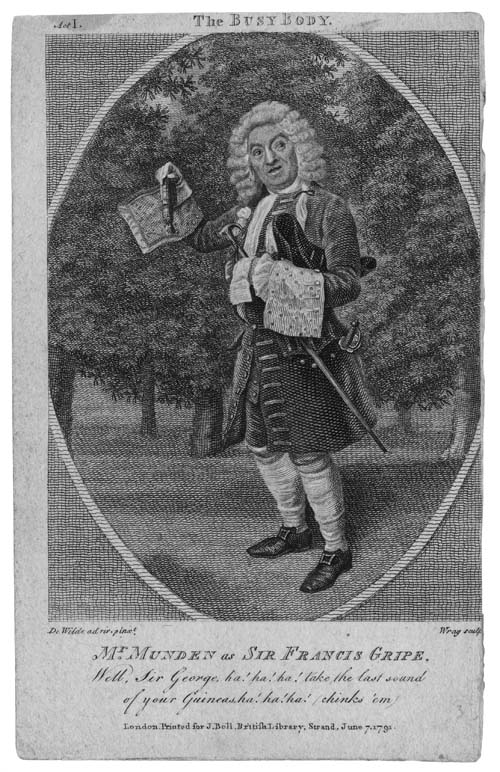Articles

Anon. advertisement for new plays, in the back of Evelina
Vol. 1 (London: Printed for T. and W. Lowndes, No. 77, in Fleet Street, 1784).
The list of plays included in The New English Theatre, a collection of 60 plays in 12 volumes, mentions contemporary actors in key parts. Henry Woodward is featured as Marplot, a role he reprised in Centlivre’s sequel, Marplot in Lisbon. Shuter’s performance of Obidiah Prim also merits mention with the listing of A Bold Stroke for a Wife.
From The Busie Body

Morning Post, July 13, 1797, Issue 7905. Advertisement for The Busy Body in Botany Bay.
This copy of a playbill from Botany Bay, reported as a news item, illustrates attitudes about the civilizing function of theatre, a strong counter-current to anti-theatrical discourse. Timberlake Wertenbaker’s 1988 Our Country’s Good, based on Thomas Keneally’s novel The Playmaker, tells the story of a group of transported convicts and officers who stage The Recruiting Officer in New South Wales. Robert Sideway, a character in that story, is mentioned below.
From The Busie Body

The Newgate Calendar
From The Newgate Calendar, comprising interesting memoirs of the most notorious characters who have been convicted of outrages on the laws of England since the commencement of the eighteenth century; with anecdotes and last exclamations of sufferers. London: 1773: 1780.
From The Beggar's Opera

Morning Chronicle
September 23, 1773, Issue 1353
The Chronicle reprinted Jonathan Swift’s defense of the play from The Intelligencer no. 3, 1728 after a series of articles about the deleterious effects of The Beggar’s Opera on the public.
From The Beggar's Opera

The Public Ledger 1760 July 14, Vol.1 No.158.
The author provides a brief notice of publication of The Minor along with a commendatory reflection on Foote and his play.
From The Minor

The London Chronicle 1760 July 31–Aug 2,Issue 562
The author makes a few general but favorable remarks on The Minor, followed by a synopsis that focuses on the metatheatrical aspects of the play.
From The Minor

The Jubilee Celebrations at Stratford-upon-Avon in the newspapers
The following archive of newspaper clippings tracks the reporting on the Jubilee at Stratford-upon-Avon from its inception to its soggy end. It includes a wide range of materials: some of the papers enthusiastically supported Garrick’s plans, others saw it is a perfect opportunity for satire on the pretensions of the Manager.
From The Jubilee

Further Reviews of the Play
i. Lloyd’s Evening Post Oct. 13–16, 1769. An Account of the New Entertainment called The Jubilee, which was performed for the first time at the Theatre Royal in Drury-lane, on Saturday last.
From The Jubilee

Newspaper Reviews: Richard Cumberland, The West Indian (1771)
1. General Evening Post, 19–22 January 1771
An Account of the New Comedy called the West Indian, as it was performed for the first time, at the Theatre Royal in Drury-lane, on Saturday night last.
From The West Indian

Reviews and other notices in the Newspapers of She Stoops to Conquer
1. Public Advertiser, Mar. 18, 1773
The new comedy of She Stoops to Conquer, or the Mistakes of a Night, now performing at the
From She Stoops to Conquer

Further Newspaper Reviews of Inkle and Yarico (1787)
1. Morning Chronicle and London Advertiser, Aug. 6, 1787
Theatrical Intelligence.
On Saturday evening a new comick opera called Inkle and Yarico, was performed at the Haymarket Theatre … [Cast list omitted]
From Inkle and Yarico

Newspaper Reviews: Belle’s Stratagem (1780)
Gazetteer and New Daily Advertiser, Feb. 26, 1780
Theatrical Intelligence.
We purposely avoid giving an account of the performers in the new comedy of The Belle’s Stratagem, till the second night; from a wish to do justice to so excellent a performance, in which so many of the principal actors are engaged. The first night of a new play ought generally to be considered as the last rehearsal, rather than the first finished performance, from the number of little awkward circumstances which intervene, and destroy the intended effect; especially in a play of so much variety, bustle, and business, as the present.
From The Belle's Stratagem

Newspaper Reviews: The School for Scandal
1. London Chronicle, May 8, 1777
An Account of the School for Scandal, performed for the first time at Drury-lane Theatre last night.
The School for Scandal is the production of Mr. Sheridan, and is an additional proof of that gentleman’s great abilities as a dramatic writer. The object of the satire is two-fold—detraction and hypocrisy, which are the prevailing vices of the times; by the first the good are reduced to a level with the worthless, and by means of the second the latter assume the appearance of men of virtue and sentiment. Nothing, therefore, could have been more seasonable than this comedy, which, in point of execution, is equal, if not superior, to most of the plays produced these last twenty years. The characters are drawn with a bold pencil, and coloured with warmth and spirit …
From The School for Scandal